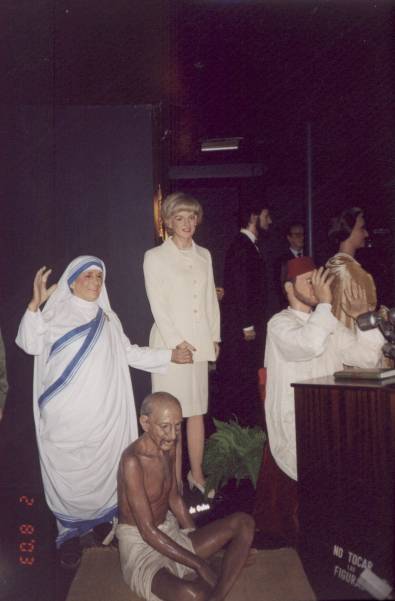|  [Listen toGandhi's Speach] [Listen toGandhi's Speach]
Gandhi, also known as Mahatma Gandhi was a frail man who devoted his life to peace and brotherhood in order to achieve social and political progress.
Gandhi was one of the gentlest of men, a devout and almost mystical Hindu, but he had an iron core of determination. Nothing could change his convictions. This combination of traits made him the leader of India 's nationalist movement. Some observers called him a master politician. Others believed him a saint. To millions of Hindus he was their beloved Mahatma, meaning soul.
Mohandas Karamchand Gandhi was born on Oct. 2, 1869 , in Porbandar, near Bombay . His family belonged to the Hindu merchant caste Vaisya. His father had been prime minister of several small native states. Gandhi was married when he was only 13 years old. In 1891, after having been admitted to the British bar, Gandhi returned to India and attempted to establish a law practice in Bombay (now Mumbai), with little success. Two years later an Indian firm with interests in South Africa retained him as legal adviser in its office in Durban . Arriving in Durban , Gandhi found himself treated as a member of an inferior race. At Natal he was the first so-called lawyer admitted to the supreme court. He then built a large practice. His interest soon turned to the problem of fellow Indians who had come to South Africa as laborers. He had seen how they were treated as inferiors in India , in England , and then in South Africa . In 1894 he founded the Natal Indian Congress to agitate for Indian rights. Yet he remained loyal to the British Empire . In 1899, during the Boer War, he raised an ambulance corps and served the South African government. In 1906 he gave aid against the Zulu revolt. Gandhi remained in South Africa for 20 years, suffering imprisonment many times.
Later in 1906, however, Gandhi began his peaceful revolution. He declared he would go to jail or even die before obeying an anti-Asian law. Gandhi's writings and devout life won him a mass of Indian followers. Thousands of Indians joined him in this civil disobedience campaign. Yet in World War I he again organized an ambulance corps for the British before returning home to India in 1914. . In 1919 he became a leader in the newly formed Indian National Congress political party. In 1920 he launched a noncooperation campaign against Britain , urging Indians to spin their own cotton and to boycott British goods, courts, and government. This led to his imprisonment from 1922 to 1924. In 1930, in protest of a salt tax, Gandhi led thousands of Indians on a 200-mile (320-kilometer) march to the sea to make their own salt. Again he was jailed.
In 1934 he retired as head of the party but remained its actual leader. Gradually he became convinced that India would receive no real freedom as long as it remained in the British Empire . Early in World War II he demanded immediate independence as India 's price for aiding Britain in the war. When World War II broke out, the Congress Party and Gandhi demanded a declaration of war aims and their application to India . As a reaction to the unsatisfactory response from the British, the party decided not to support Britain in the war unless the country were granted complete and immediate independence. The British refused, offering compromises that were rejected. When Japan entered the war, Gandhi still refused to agree to Indian participation. He was interned in 1942 but was released two years later because of failing health.
By 1944 the Indian struggle for independence was in its final stages, the British government having agreed to independence on condition that the two contending nationalist groups, the Muslim League and the Congress Party, should resolve their differences. Gandhi stood steadfastly against the partition of India but ultimately had to agree, in the hope that internal peace would be achieved after the Muslim demand for separation had been satisfied. India and Pakistan became separate states when the British granted India its independence in 1947. During the riots that followed the partition of India , Gandhi pleaded with Hindus and Muslims to live together peacefully. Riots engulfed Calcutta , one of the largest cities in India , and the Mahatma fasted until disturbances ceased. On January 13, 1948 , he undertook another successful fast in New Delhi to bring about peace. But on January 30, 12 days after the termination of that fast, as he was on his way to his evening prayer meeting, he was assassinated by Nathuram Godse, a Hindu fanatic.
Gandhi became the international symbol of a free India . He lived a spiritual and ascetic life of prayer, fasting, and meditation. His union with his wife became, as he himself stated, that of brother and sister. Refusing earthly possessions, he wore the loincloth and shawl of the lowliest Indian and subsisted on vegetables, fruit juices, and goat's milk. Indians revered him as a saint and began to call him Mahatma (Sanskrit, “great soul”), a title reserved for the greatest sages. Gandhi's advocacy of nonviolence, known as ahimsa (Sanskrit, “noninjury”), was the expression of a way of life implicit in the Hindu religion. By the Indian practice of nonviolence, Gandhi held, Britain too would eventually consider violence useless and would leave India .
Gandhi's death was regarded as an international catastrophe. His place in humanity was measured not in terms of the 20th century but in terms of history. A period of mourning was set aside in the United Nations General Assembly, and condolences to India were expressed by all countries. Religious violence soon waned in India and Pakistan , and the teachings of Gandhi came to inspire nonviolent movements elsewhere, notably in the U.S. under the civil rights leader Martin Luther King, Jr. [UP] |

